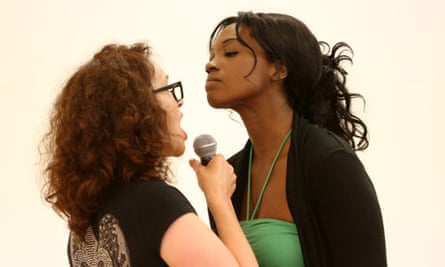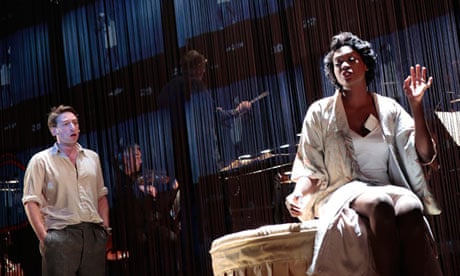'I was very much intrigued by blaxploitation movies when working on American Lulu," says Olga Neuwirth. This isn't quite what I expected from one of Austria's most respected, serious and established composers. Neuwirth's talking about her controversial reworking of Lulu, Alban Berg's great unfinished opera, which receives its British debut this month at the Edinburgh festival. "Blaxploitation movies," she adds, "are all about the fluid boundaries between trash and counterculture. And that's all there in Berg's original."
What's radical about Neuwirth's American Lulu isn't just that she has dared to finish what her countryman couldn't ('much of the orchestration and some of the composition of the third act of this luridly sensual and musically complex opera was incomplete by the time of Berg's death in 1935). It's the fact that Neuwirth sets the story of Lulu's manipulative rise and desperate fall not in the fetid European cities of Berg's original, but turns her into a freedom-fighting black woman amid the civil-rights struggle in 1950s New Orleans and 1970s Manhattan – and comes up with a new text in English to boot. She also arranges Berg's music for a glorified jazz band while compressing the opera's structure, throwing out much of Berg's score, and inserting an ending very different to what was originally envisaged.
Let's put that in context: Neuwirth is nothing if not audacious. This is a bit like a British composer having another go at Elgar's Enigma Variations, a French composer remixing Debussy's La Mer, or a Russian rewriting Tchaikovsky's Eugene Onegin – because Lulu is one of the sacred cows of Austrian musical culture. You mess with it at your peril. Doesn't she feel just a tiny bit audacious? "One has to be very careful," she says, "because this is the golden calf of 20th-century music. Who was I to dare to do this, especially as a woman and an Austrian? I knew also that I would be slaughtered by the critics and the music historians – just like Jack the Ripper slaughters Lulu at the end of Berg's opera."
Which is pretty much what happened when American Lulu had its world premiere in Berlin last year. Our own Andrew Clements was typical in his assessment: the work, he wrote, "deprives the character of its humanity and vulnerability, and replaces that with nothing interesting at all". Neuwirth is unperturbed. "It's very easy to just dismiss it," she says, "to say it's all bad, just to get rid of it." Audiences in Edinburgh (and later in London) needn't fear, though: the British debut is a brand-new production.
Neuwirth knew exactly what she wanted to achieve by changing the fabric of Lulu's story, which in Berg's original sees this femme fatale murder a man who gets in her way, and then seduce pretty much every character – Countess, Painter, Doctor, Acrobat, Schoolboy – leaving her own life and everyone else's in ruins. For Neuwirth, transplanting the drama to the civil-rights struggle makes an essential point about the piece and its relevance today. "We are again in times when we need to deal with sexism, racism and class. For me, it was a very modern topic. I thought, let's go mad with this, and actually think about what people make of this female myth. When I started to talk about Lulu to people, what really astonished me was that everyone has their own idea of who she is. People have a Lulu in their life, or even think they are Lulu."

That's not surprising. Berg's Lulu is first exhibited as a snake in the circus-act prologue; she becomes murderess and seductress, oppressor and oppressed. She's a blank canvas for every other character's feelings – and for all of us watching. So who is she for Neuwirth? "To me, she's rather a cold woman, a narcissist who gets what she wants at every moment in the opera. She lives off and through men, and she humiliates and pampers people. She brainwashes them. I'm not very sympathetic to this kind of personality."
But in Neuwirth's retelling, there is another dimension to her personality, since Lulu is a freedom fighter battling for civil rights, who uses everyone in the story as a means to this end. That's made most explicit by the excerpts from speeches by Martin Luther King and poems by June Jordan. And it's embodied in Lulu's relationship with Eleanor (Neuwirth's version of Berg's Countess Geschwitz character), who falls desperately in love with Lulu. Most of the third act of American Lulu is a big scene between Lulu and Eleanor. The former still behaves monstrously to her ex-lover, but Eleanor has managed to find a way to express her pain and escape Lulu's orbit. "I wanted to show this other woman – who comes from the same background of abuse as Lulu, who is treated as an object by the same macho white and black men – trying to find her own path to freedom and identity. It is maybe more strenuous for Eleanor, but she does it. That's what my whole third act is about."
I catch up with rehearsals in London, where director John Fulljames is taking Lulu and Eleanor – American soprano Angel Blue and jazz singer Jacqui Dankworth respectively – through that final act. Lying about the rehearsal room are costumes that reference blaxploitation films, not to mention Josephine Baker's banana skirt. An American footballer shoulders past me (Neuwirth's updating of the Acrobat character), while a white-clad pimp chews on a toothpick and devours Lulu with his eyes. For Blue, the civil-rights setting is only part of what American Lulu is doing. "It could have been anything: it could have been a Jewish girl in Frankfurt in 1942. It could be any oppressed community from history. When I'm on stage, I don't see myself necessarily as a black woman – just as a woman going through these different situations with men and women."
Fulljames adds: "I see Lulu as somebody who is struggling to change the world. And the only canvas she has to do that is the canvas of her own life, her personal relationships. And she sees those as part of a much wider struggle in society. For me, she's the most radical person and the most intelligent person on stage. And although by the end of the piece, we don't agree with her methods, we support her struggle. The key story we need to tell in the opera is that it's ongoing. It's a struggle epitomised in that awful fight between Lulu and Eleanor in act three. And if the audience feel the struggle is won, we haven't got the point across."
For Neuwirth, writing American Lulu – and re-writing Lulu – is far from an act of vandalism. "Berg's music is genius," she says. "With its rich musical language and construction, it's obsessed with the mythical figure of Lulu. In other artforms – visual art or film – it's accepted that it's possible to do rethinkings. But in classical music or new music, it's still a scandal."
You could see American Lulu as another remarkable tribute to the protean potential of its lead. "We all reflect on our personal lives through her," says Neuwirth. "Whether we're talking about women and sexuality, or social and political issues, Lulu has so much to say to every human being."
American Lulu is at King's theatre, Edinburgh, 30-31 August (0131-473 2000/eif.co.uk). Then at the Young Vic, London, 13-24 September (020-7922 2922/youngvic.org).

Comments (…)
Sign in or create your Guardian account to join the discussion